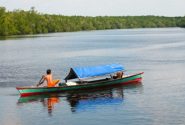
Land tenure needs to be clarified before communities can benefit from REDD+ in Vietam. Photo by Vu Bui/Flickr
SEOUL, South Korea (September 20, 2012) __A United Nations scheme aimed at slashing greenhouse gas emissions through forest protection could help ease rural poverty in Vietnam, but only if there are significant changes to the country’s land tenure system, a new publication says.
Reducing Emissions from Deforestation and Forest Degradation (REDD+) aims to reduce carbon emissions from the destruction and degradation of forests – responsible for around 20% of greenhouse gasses globally – by effectively getting rich nations to pay developing countries to make sure trees are left standing.
Currently, state companies and management boards control more than half of Vietnam’s natural forests with locals contracted out to protect them, said Pham Thu Thuy, a scientist with the Center for International Forestry Research and co-author of Evidence-based Conservation: Lessons from Lower Mekong. But with no effective benefit sharing system or enforcement mechanism in place, REDD+ payments often do not reach the poorest individuals and communities.
“Poor households are often excluded because they do not have land titles,” she said.
But land tenure restrictions are not the only problem facing REDD+. According to CIFORs Daniel Murdiyarso, the payment scheme needs to adapt and learn from the recent failings of integrated conservation and development practices (ICDPs) in order to succeed. Unlike ICDPs, Murdiyarso argues that REDD+ projects must (and most importantly) have clearly defined measureable project goals, be able to secure long-term funding and find markets for products resulting from alternative livelihoods.
Despite an institutional shift away from ICDPs in favour of REDD, Murdiyarso, another the book’s contributing authors, remains cautious in his outlook for the scheme.
“REDD+ is new and may be too difficult to successfully implement,” he says. “Although it was widely known the reputation of ICDPs was not that good, there should be a mid-way to get things working.”
In Vietnam, the dominance of the local elite in managing land means that such ecosystem payments are often unevenly distributed among the top echelons of society. Not only does the state monopolise access to land, but it also ensures that it maintains management of high-quality forests, leaving only degrading plots to be allocated to households and communities. Owing to their more fragile state, these lands often come with stricter responsibilities for forest protection and lower benefits.
But for many villagers, this is the only way they can increase their access to land.
As such, many are willing to endure the arduous procedure of attain land use rights.
Co-management is the favoured management model in Vietnam, and sees the state granting individuals the right to protect and engage in sustainable management activities on land it owns.
To obtain land use right certificates, however, locals must submit many forms and follow many complex bureaucratic procedures, and occasionally make extra payments, to the head of the village commune.
Experts say to maximize a trickling down of financial gains, more attention needs to be paid on improving the lives of households and communities who depend on the forest ecosystems.
The Lower Mekong Basin, which flows through a complex delta system in Vietnam before funnelling out to sea, is one of the world’s most biologically diverse regions. It is also home to some of the poorest people.
As such, the Vietnam government is working on incorporating economic and development strategies — top national priorities — into its environmental policy.
In recent years, it has laid foundations to strengthen REDD+ and payments for environmental services (PES) through numerous national protection programs and pilot schemes.
Pham nevertheless argues that the future success of such initiatives requires several changes, particularly to the country’s land tenure system.
She explained that while state companies and management boards control more than 50 percent of the natural forests, individual households manage less than 20 percent and village communities only one percent.
Because locals are often contracted to protect government-owned forests, REDD+ payments come indirectly. While some argue the funds are often too small to offer a genuine route out of poverty, Pham noted this is because they are held up at the provincial level or not based on assessments of opportunity costs.
To benefit households, she said “land allocation processes need to be accelerated and made simple and transparent, and barriers such as complicated procedures and unofficial costs need to be removed.”
By doing so, Pham hopes revenues will flow to the local people who are responsible for ensuring the continued provisions of incentive schemes.
Money, however, is not everything. Poverty, Pham argues, is a multi-dimensional phenomenon and should be assessed more broadly than on economic income alone. “
If PES and REDD+ are to be pro-poor … quantitative survey methods need to be complimented by qualitative livelihood studies,” Pham argues, explaining that wellbeing and freedom of choice are also measures of poverty.
To ensure the poor are well-protected, intermediaries and watchdogs, such as government agencies, NGOs and private consulting firms, can be brought in to act on behalf of communities.
While such buffers can be effective and essential to market-based incentive schemes, Pham noted that a dependency on intermediaries can lead to exploitation and a negative influence on decisions.
“Intermediaries are expected to be neutral however, in most current PES schemes in Vietnam, they, particularly private consulting firms, only work for the benefits of the environmental service buyers (such as water supply companies) as and do not consult the environmental system sellers (such as households),” Pham says.
Despite Pham’s concerns, she stressed that pro-poor REDD+ policies in Vietnam must complement existing economic and development initiatives, rather than replace them. As such, pro-poor schemes must be in line with government policies for addressing poverty and environmental protection.
“REDD+ policies should not contradict government policies. After all, cross-sector approaches, effectiveness, efficiency and equity are key elements of REDD’s success,” she says.
To get your copy of Evidence-based Conservation: Lessons from the Lower Mekong please click here.
Edited by Michelle Kovacevic and Robin McDowell.
We want you to share Forests News content, which is licensed under Creative Commons Attribution-NonCommercial-ShareAlike 4.0 International (CC BY-NC-SA 4.0). This means you are free to redistribute our material for non-commercial purposes. All we ask is that you give Forests News appropriate credit and link to the original Forests News content, indicate if changes were made, and distribute your contributions under the same Creative Commons license. You must notify Forests News if you repost, reprint or reuse our materials by contacting forestsnews@cifor-icraf.org.











